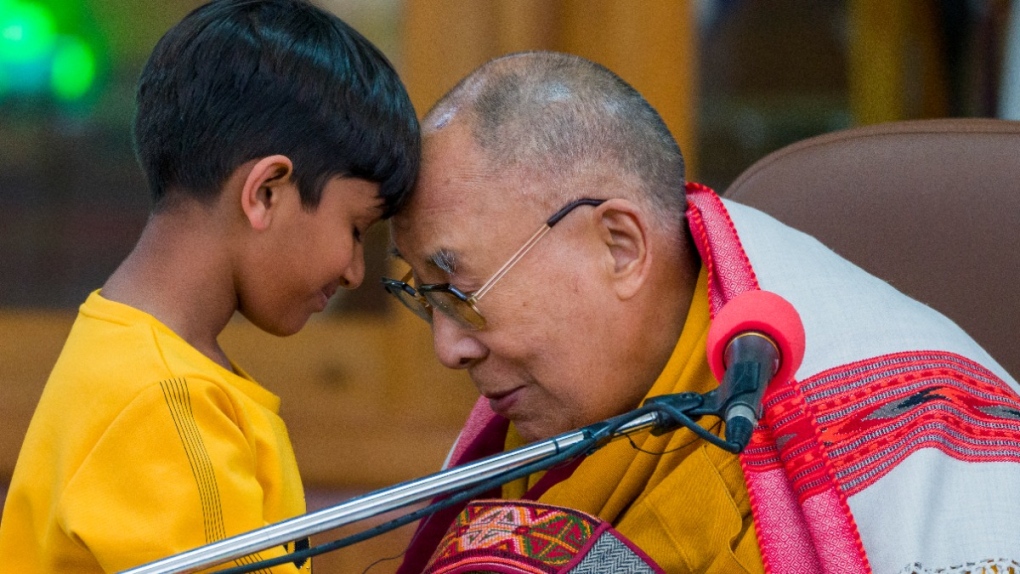There has been widespread outrage and calls for the prosecution of the Dalai Lama for child abuse in the wake of a video of his inappropriate interaction with a boy that went viral. The video in question, which surfaced online in early June, depicts the spiritual leader of Tibet kissing a young boy on the mouth during his visit to Dharamshala, India.
The video shows the Dalai Lama welcoming a group of visitors to his residence in Dharamshala. Among the visitors is a young boy, who appears to be around 5 or 6 years old. As the boy approaches the Dalai Lama, the spiritual leader reaches out and pulls him towards him. The Dalai Lama then kisses the boy on the mouth and rubs his head affectionately. The boy appears to be uncomfortable and pulls away from the Dalai Lama, who then laughs and pats him on the back.
The video quickly went viral, with many people expressing shock and outrage at the Dalai Lama’s actions. Many accused him of child abuse and inappropriate behavior, with some even calling for him to step down from his position as spiritual leader. Others defended the Dalai Lama, arguing that his actions were meant to show affection and that they were not intended to be sexual in nature.
The Dalai Lama has issued a statement in which he apologised for any offence caused by his actions. He explained that in Tibetan culture, it is common for people to show affection by kissing on the mouth, and that he had not intended to cause any harm or offence. He also emphasised his commitment to promoting non-violence and compassion towards all beings, including children.
Exploring the cultural context of the interaction
To understand the controversy surrounding the Dalai Lama’s actions, it is important to consider the cultural context in which they occurred. In Tibetan culture, physical affection is often expressed through touch, and kissing on the mouth is not seen as a sexual act. Instead, it is seen as a gesture of love and affection, similar to a hug or a peck on the cheek in Western culture.
The issue of child abuse and consent
Despite the cultural context, many people have accused the Dalai Lama of child abuse and inappropriate behavior. This raises important questions about consent and power dynamics in relationships between adults and children. While the Dalai Lama may have intended his actions as a gesture of affection, the young boy in the video appeared uncomfortable and did not give his consent to the kiss. This raises important questions about the importance of respecting children’s boundaries and the need for clear guidelines around physical contact between adults and children.
The use of tongues in Tibetan culture
One of the most controversial aspects of the video is the use of tongues during the kiss. While this may be seen as inappropriate in Western culture, it is not uncommon in Tibetan culture. The use of tongues during a kiss is seen as a way to express deep affection and spiritual connection. However, this cultural difference has sparked outrage and confusion among those who are not familiar with Tibetan traditions.
The impact on the Dalai Lama’s reputation
The controversy has had a significant impact on the Dalai Lama’s reputation, with many people questioning his judgement and suitability as a spiritual leader. This has been especially difficult for those who have long admired and respected the Dalai Lama as a symbol of peace and compassion. However, others have defended the Dalai Lama, arguing that the controversy is a result of cultural misunderstandings and that his actions should be viewed in context.
The controversy surrounding the Dalai Lama’s interaction with a young boy has sparked important conversations about cultural differences, child abuse, and consent. While it is important to respect cultural traditions and differences, we must also be mindful of the need to prioritise the safety and well-being of children. This requires clear guidelines around physical contact between adults and children and a commitment to respecting children’s boundaries and autonomy. As we continue to learn from this incident, we can work towards creating a safer and more compassionate world for all.
